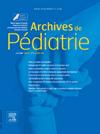Food protein induced enterocolitis syndrome: French practices assessment in children
IF 1.3
4区 医学
Q3 PEDIATRICS
引用次数: 0
Abstract
Background
Food protein-induced enterocolitis syndrome (FPIES) is a specific non IgE-mediated food allergy. The international consensus guidelines defined diagnosis criteria and management plan in 2017.
Objectives
To assess practices regarding FPIES in France and in French-speaking countries, according to those guidelines.
Methods and Setting
We carried out a 22-question online survey to assess practices of specialised physicians (paediatricians, allergists, gastroenterologists, members of 2 French-speaking learning societies and/or working at hospitals in paediatric allergy units) following patients with FPIES between August 2019 and February 2022.
Results
We received 92 replies to our survey, mostly from hospital practitioners following less than 10 patients with FPIES. Oral rehydration solution and/or Ondansetron were largely prescribed in the emergency kit (61/72, 84.7 % and 47/72, 65.3 % respectively). 20 practitioners declared never prescribing an emergency kit. There was some confusion when distinguishing between FPIES and an IgE-mediated food allergy, as suggested by the unnecessary prescription of an antihistamine (18/72, 25.0 %) and/or epinephrine (11/72, 15.3 %) in the emergency kit. An explanatory FPIES emergency management letter to physicians in case of allergic reactions was provided in 83.7 % (77/92) of patients. Oral food challenge (OFC) practices varied greatly concerning doses: most respondents used several doses (52/92, 56.5 %) during the same day (33/52, 63.4 %). Eleven responders (12.0 %) used the same protocol as for an IgE-mediated food allergy.
Conclusion
Our survey showed that practices of FPIES management in France are generally aligned with the international consensus guidelines. There are still pending issues to be standardised, such as the emergency kit prescription and its contents, as well as OFC management strategies. This work confirms the need for continuous training of physicians regarding FPIES management. Further guidelines are needed to improve standardisation of FPIES management.
食物蛋白诱导的小肠结肠炎综合征:法国儿童实践评估。
背景:食物蛋白诱导的小肠结肠炎综合征(FPIES)是一种特异性的非ige介导的食物过敏。国际共识指南于2017年确定了诊断标准和管理计划。目的:根据这些指南,评估法国和法语国家关于FPIES的实践。方法和环境:我们进行了一项包含22个问题的在线调查,以评估专业医生(儿科医生、过敏症专家、胃肠病学家、2个法语学习学会的成员和/或在儿科过敏科医院工作的医生)在2019年8月至2022年2月期间对FPIES患者的做法。结果:我们收到了92份调查回复,大部分来自医院从业人员,他们跟踪了不到10名FPIES患者。口服补液和/或昂丹司琼主要在急救包中使用(分别为61/ 72,84.7%和47/ 72,65.3%)。20名医生宣称从未开过急救包。在区分FPIES和ige介导的食物过敏时存在一些混淆,这表明急救包中不必要的抗组胺药(18/ 72,25.0%)和/或肾上腺素(11/ 72,15.3%)处方。83.7%(77/92)的患者在发生过敏反应时向医生提供了解释性FPIES应急管理信。口服食物激发(OFC)的做法在剂量方面差异很大:大多数应答者在同一天(33/52,63.4%)使用了几个剂量(52/ 92,56.5%)。11名应答者(12.0%)使用了与ige介导的食物过敏相同的治疗方案。结论:我们的调查显示,法国的FPIES管理实践总体上与国际共识指南一致。目前仍有一些有待标准化的问题,如急救包处方及其内容,以及OFC管理战略。这项工作证实了对医生进行FPIES管理方面的持续培训的必要性。需要进一步的指导方针来提高FPIES管理的标准化。
本文章由计算机程序翻译,如有差异,请以英文原文为准。
求助全文
约1分钟内获得全文
求助全文
来源期刊

Archives De Pediatrie
医学-小儿科
CiteScore
2.80
自引率
5.60%
发文量
106
审稿时长
24.1 weeks
期刊介绍:
Archives de Pédiatrie publishes in English original Research papers, Review articles, Short communications, Practice guidelines, Editorials and Letters in all fields relevant to pediatrics.
Eight issues of Archives de Pédiatrie are released annually, as well as supplementary and special editions to complete these regular issues.
All manuscripts submitted to the journal are subjected to peer review by international experts, and must:
Be written in excellent English, clear and easy to understand, precise and concise;
Bring new, interesting, valid information - and improve clinical care or guide future research;
Be solely the work of the author(s) stated;
Not have been previously published elsewhere and not be under consideration by another journal;
Be in accordance with the journal''s Guide for Authors'' instructions: manuscripts that fail to comply with these rules may be returned to the authors without being reviewed.
Under no circumstances does the journal guarantee publication before the editorial board makes its final decision.
Archives de Pédiatrie is the official publication of the French Society of Pediatrics.
 求助内容:
求助内容: 应助结果提醒方式:
应助结果提醒方式:


